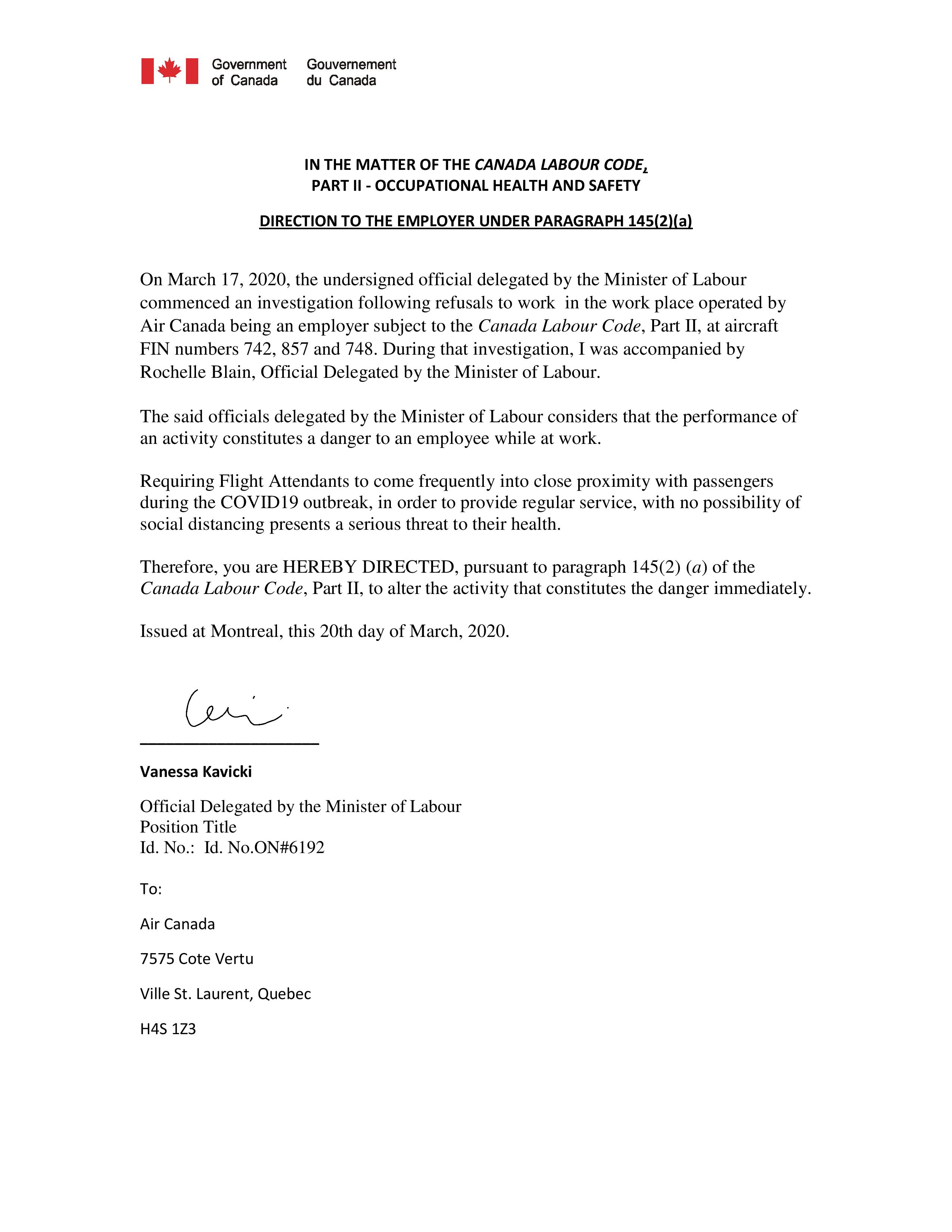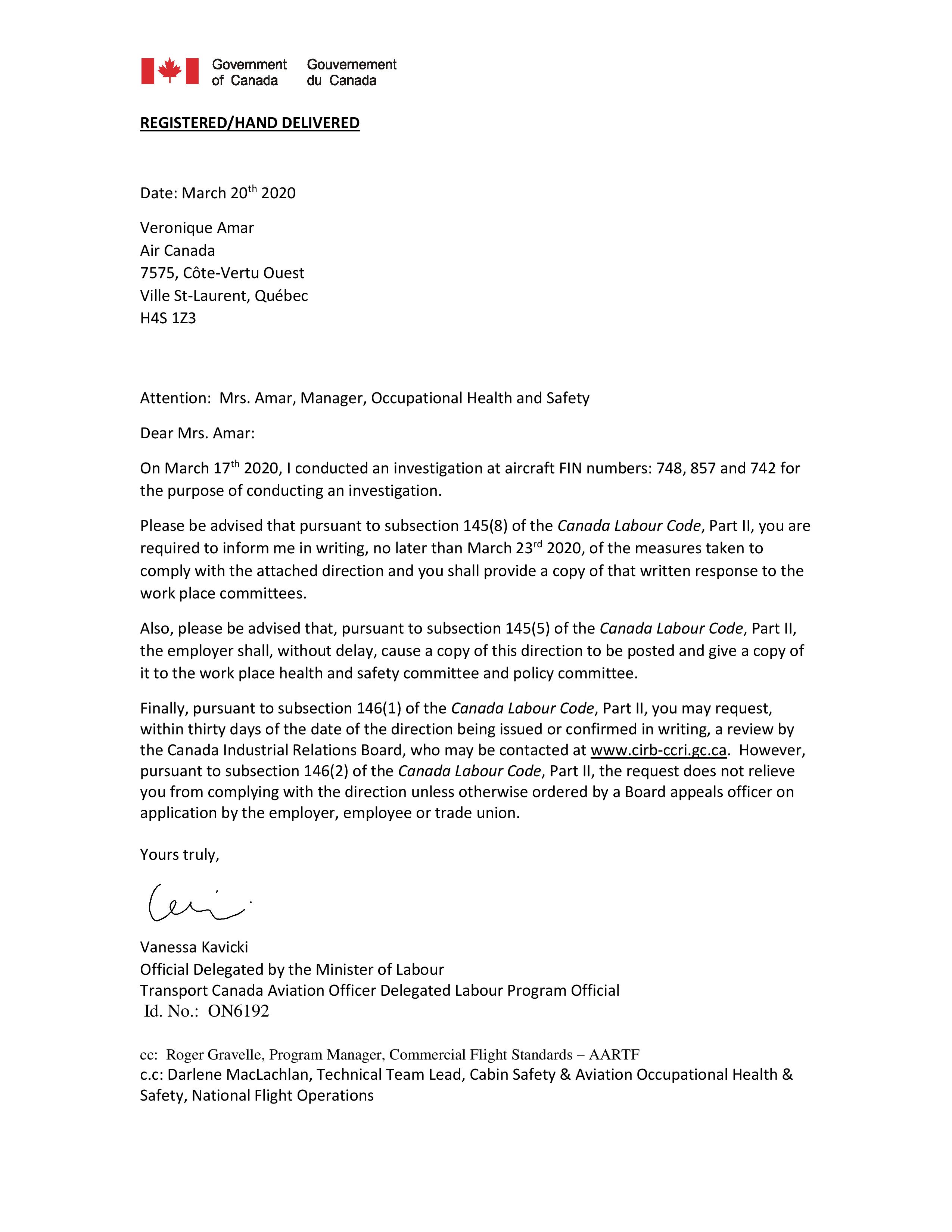COVID-19 Danger Decision Update:
Following the Union’s N95 respirator bulletin issued on March 22, 2020, (click HERE to view), many of you have written or called to ask what the company has done to comply with the direction issued by Transport Canada (TC).
It was the Union’s understanding, based on the direction and cover letter (see images below), that the company was to provide a response no later than March 23, 2020. The company provided said response, in which it stated that it believed that the service changes announced in bulletins issued on the 17th, 18th, and 21st of March put it in compliance.
DIRECTION (referenced above) – Click HERE to view a PDF version

COVER LETTER (referenced above) – Click HERE to view a PDF version

Since then, despite numerous emails and phone calls from the Union, we have not heard from Transport Canada (TC) as to whether it has accepted the company’s response. We believe that TC is still in the process of investigating the company’s response as the last correspondence from them, dated March 24, 2020, requested further information.
The Union is as frustrated as you are by this lack of clarity, particularly as the employer has now begun telling employees involved in the concerned work refusals that the workplace is now safe, as the company believes it has met TC’s requirements.
Work Refusal Issue Update:
Many members have expressed upsetting and unacceptable experiences when attempting to exercise their worker’s rights, specifically the right to refuse dangerous work. These have included members being told (incorrectly):
- A work refusal can only be done while onboard the aircraft
- You can’t refuse to work because there is no imminent risk of death
- A reminder to employees that there must be an imminent threat to life, followed by an amended (yet still incorrect) reminder that this also includes imminent threat to health. Members should know that the definition of danger also includes serious threat to life or health.
- Being told that step 1 of a refusal must take place at the gate
- That exercising their right to refuse will “bite them in the ass” [management’s words not ours]
- That due to an exemption to the 14-day self-isolation rules from the PHAC, an employee cannot refuse dangerous work and it is a health and safety complaint.
- The repeated use of the 517-unavailable with fault code and failure to promptly correct it. There is simply no need – other codes can be assigned as this one creates fear and anxiety in our members.
- Employees being told at the end of step one that “these are your only options” instead of correctly referring to the process as outlined in the Code and the FAM.
- Employees being reminded that if they refuse it will delay an entire aircraft full of passengers.
- Employees being told on the phone by scheduling that they cannot exercise their right to refuse and will be given unavailable for duty.
- Employees being told on the phone that they must make a decision to operate on-the-spot.
ALL of these are wrong and have been addressed directly by your base/component officers as well as your health and safety representatives to senior management including Renee Smith-Valade and Sam Elfassy. The Union has requested a response no later than 17:00 on March 26, 2020 as to how the company intends to resolve this issue.
If you have attempted a work refusal and, due to this, have been denied pay credits, given a no show, personal leave or displaced without pay, we need to hear from you immediately.
Should you require information about the right to refuse dangerous work:
N95 respirator face shield update:
As you know the company came out with a bulletin announcing new personal protective equipment in the form of N95 respirator face shields on March 21, 2020. These began being issued to crews in comm centres on March 22, 2020.
Since then many of you have expressed concerns regarding lack of training, proper fitment, confusing care instructions, the fact that it makes no sense that you have been provided only one mask in the event it becomes damaged or soiled while away on pairings.
It is important that members understand the tireless work of its safety reps who have been advocating for N95 respirator face shields and pandemic PPE for its members for 15 years, but with proper fit testing, proper training, and proper supplies:
- 2005: In the wake of SARS, a file was opened at the Policy Health and Safety Committee (PC) to ensure proper PPE in future pandemics.
- 2009: The company notifies crews in its monthly newsletter than N95 masks were being removed from aircraft and replaced with surgical ones.
- 2010: The IFS PC submitted a recommendation which the company accepted, which suggested that a minimum of 1 month’s supply of extra PPE be available to ensure adequate supplies on all flights. This was further raised with the company at the start of this pandemic and we were assured that management had this under control and that an order of sufficient supplies had been purchased in accordance with its pandemic plan.
- 2015: After years of changing titles, the file on communicable disease was unilaterally closed by the employer, who stated that it was up to corporate safety and occupational health to manage and not a program for the committee.
- 2017: It took 1.5 years for the Union to get the file re-opened, relying on on a prior order from the Occupational Health and Safety Tribunal of Canada that the company maintain a communicable disease program at PC. File on masks is closed after confirmation that fit testing is required and employer not willing to conduct.
- 2017: the employee reps at the PC began raising air quality issues at some destinations, again asking for N95 respirator face shields with proper fit testing and training.
- 2018/2019: Despite having an open file on communicable diseases, unbeknownst to the Union and without any participation or consultation of the Policy Committee the company created a pandemic plan. The union’s first viewing of this document took place on February 4, 2020, well into this pandemic. Unbeknownst to the Union the company also engaged a third-party infectious disease specialist.
- 2017-2020: the company has consistently said it isn’t feasible to provide N95 respirators for many reasons including but not limited to: the need for fit testing, the fact that fit testing hasn’t been done, arguments that the respirators may cause CO2 buildup and hypoxia (strongly disputed by the Union). In fact, as recently as last week managers were telling our concerned members that N95 respirators are dangerous onboard!
After all that, imagine the Union’s surprise when the company magically produced N95 respirators to crews. They did so without any prior consultation with the Union or the Policy Committee (PC) as required by law.
To be clear the provision of N95 respirators would have required both consultation and participation of the PC. By failing to do so, your representatives (and therefore you) were robbed of their right to address the company’s respiratory protection program and how it applies to crews, how this new PPE affects the Hazard Prevention Program, and discuss the many specific details of the PPE as required by law and the regulations.
These have been challenging times for all of us, but we have come through this collectively and professionally. Please continue to report issues and advise your Union of the concerns you are being presented with.
In Solidarity,
Wesley Lesosky
President, Air Canada Component of CUPE



